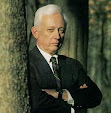One of my conscious life goals is to "leave my little mark on culture." I do this mostly through my work. I often tell my audiences that they are my slate. This blog is part of my mark and the Internet a place to leave it. I do, record, and distribute much of my work using e-mail.
This morning I was listening to Walter Isaacson, journalist, historian, and cultural commentator, on C-SPAN2's BookTV. He was bemoaning the disappearance of letter writing and the loss to the historian of this important source. He noted that most of us now use e-mail for what we used to do with letters but that e-mail is ephemeral, of limited use to the historian.
I wanted to test this assertion so I did a Google search on whmurray@dockmaster.mil, the first public e-mail address that I ever used. Now this was before the world wide web and long before Google, but sure enough, Google found many messages, not all in the same place. After listing 66 messages, Google said "In order to show you the most relevant results, we have omitted some entries very similar to the 66 already displayed." Few of the items returned seem to point to the origin or destination systems but rather to quotes or citations. So, while there are more messages than those returned, it is unlikely that all messages from the era, or even most of those with historical interest, survive.
Dockmaster may be a special case, one of historical interest. It was a domain hosted on a Multics system by the National Computer Security Center, a part of the National Security Agency. It was used by most of the computer security thought leaders of the era and hosted many productive discussions on the topic. Indeed, it was an example of many of the best ideas on the subject.
Isaacson may be right and we may have lost much of the e-mail. The e-mail I found may be exceptional. Perhaps the content of my message was exceptional; perhaps it was even curated. I found one message on anus.com, The American Nihilist Underground Society. (More on this message later.) However, as storage continues to become cheaper and denser, the potential for e-mail to survive increases. Thanks to Google, Bing, et.al., we will be able to sift the tiny number of messages with historical interest from the remainder.
Most of us are not aware of the significance of what we are saying or doing at the time we say or do it. It is only with the passage of time that the significance becomes apparent. The Internet in general, and e-mail in particular, amplify our writings. They have the potential to filter out and preserve that which is important to history. However, the recording and reporting of history are, of their essence, imperfect. History will note and report the impact of paper mail yielding to e-mail.
Isaacson did not comment on blogs, another important source for historians, replacing diaries and journals. Blogs too may prove to be ephemeral but more will be written, some will survive, and historians will be able to find those that do.
I am satisfied that electronic media contribute to "My Little Mark."
Saturday, February 7, 2015
Subscribe to:
Post Comments (Atom)





No comments:
Post a Comment